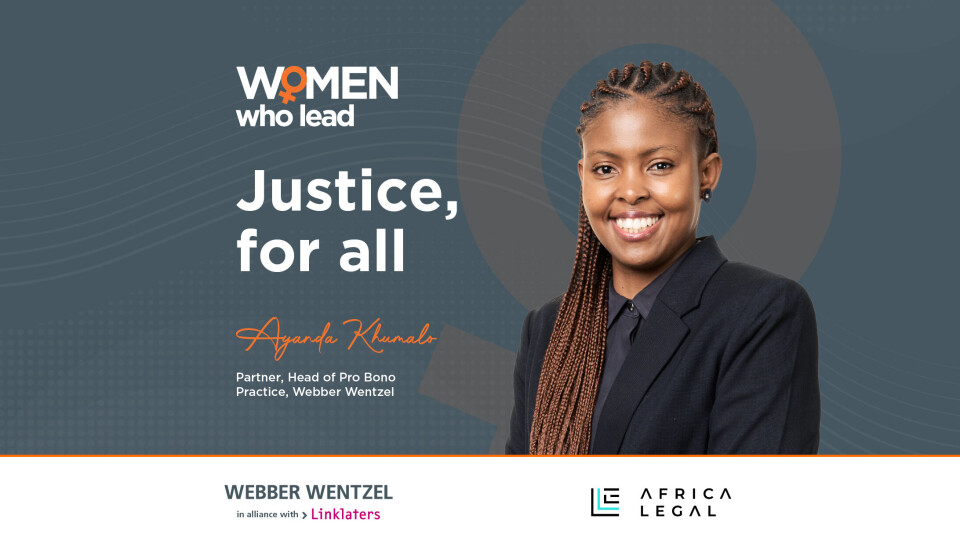Copyright : Re-publication of this article is authorised only in the following circumstances; the writer and Africa Legal are both recognised as the author and the website address www.africa-legal.com and original article link are back linked. Re-publication without both must be preauthorised by contacting editor@africa-legal.com
Women Who Lead: Justice, for all

Ayanda Khumalo recently became the Head of Webber Wentzel’s public interest practice. She discusses the power and importance of pro bono, leading groundbreaking projects that have real impact, and helping ensure access to justice.
Doing pro bono work is extremely important for law firms, says Ayanda Khumalo, not only because as lawyers we have an obligation to give back to the communities we live in, particularly when they are unequal, but to help uphold the rule of law.
“The greater part of the work we did, just before the establishment of the Zondo Commission, was bringing or being involved in a number of cases that helped to uphold the rule of law in South Africa,” says Ayanda, who first rotated through Webber Wentzel’s pro bono team as a candidate attorney, more than 15 years ago.
“We did these cases on behalf of NGOs that would not ordinarily have money to pay big fees,” she recalls. “As a pro bono department, those types of cases ensure the rule of law is upheld and strengthened. Pro bono can also be important for the development of our laws in South Africa. We’ve taken on quite an important case recently that changed the landscape of how maternity leave is interpreted.”
Ayanda rose to partner during her first stint at Webber Wentzel, before serving as a legal counsel at the South African National AIDS Council, then leading the Director-General’s Office at the Department of Health during the height of COVID.
Three years ago, Ayanda returned to Webber Wentzel as a partner in the team, and recently she became Head of the firm’s industry-leading pro bono practice.
“I’ve had to step into big shoes, because the previous leaders who’ve occupied this role are very great and celebrated lawyers in the public interest space in general,” she says. “But I think it was also important for me, because I was sort of involved in this team and building this dream with the founder of pro bono within Webber Wentzel, so it completes the circle for me, in making sure that what we were building before I left the firm, I can now see to completion. To make sure we realise what we were envisioning many years ago, and making sure the team continues to do impactful work that covers the gaps in terms of access to justice in South Africa.”
Nowadays, the Webber Wentzel pro bono team consists of several lawyers, and provides legal expertise and help to those in need across the land reform space, education, the gender-based violence space, truth and reconciliation, and health.
“Mainly we’re trying to help the vulnerable and the people who really can’t afford legal services in South Africa, which is a very unequal society,” says Ayanda. “For one example, we represent communities to get back land they were dispossessed of during Apartheid, and assist in training them to understand governance of their communal property associations, over what can be very profitable land.”
Before studying law, Ayanda considered training to be a doctor or psychologist. She always wanted a career that helped people; the reason she began her career at Webber Wentzel was because when she researched law firms, discovering they had a “very strong pro bono department” that already did “quite groundbreaking work that has real impact.” Her rotations as a candidate attorney cemented things.
“Although in the other teams I felt I was learning a lot and doing good work, when I got to the public interest team, I felt like ‘this is it, this is where I want to be, and this is the work I want to do’,” she recalls. Years later, she gets to lead that growing team.
Harnessing the power of her people, to help vulnerable people, and society.
“For me, the most important thing is ensuring that as a leader you take on board the people you’re leading, making sure that you develop them. There are a lot of juniors within the team, and it’s important to always have check-ins, to understand their concerns, get their views on how they see the trajectory and growth of the team, and whether the type of work we do is still relevant, and still having an impact.”
Working together to uphold the rule of law, and ensure access to justice, for all.
